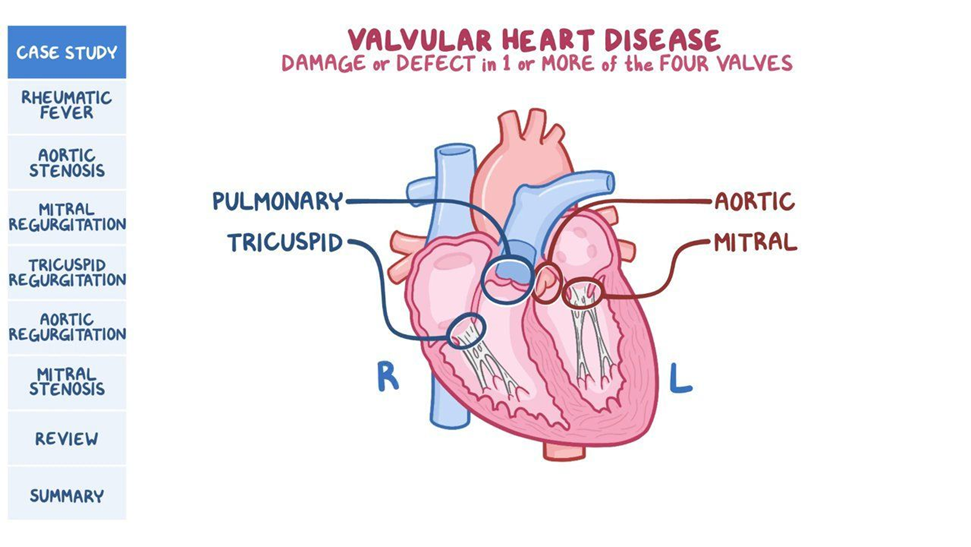A nurse is assessing a client who has valvular dysfunction. Which of the following manifestations should the nurse anticipate? (Select all that apply)
Heart murmur
Chest pain
Varicose veins
Palpitations
Abdominal pain
Correct Answer : A,B,D
Choice A reason:
Heart murmur is a common manifestation of valvular dysfunction. It occurs when there is turbulent blood flow across a damaged or abnormal heart valve. This can be due to stenosis (narrowing of the valve) or regurgitation (leakage of the valve). The murmur’s characteristics, such as timing, location, and intensity, can help in diagnosing the specific type of valvular disease. For example, a systolic murmur might indicate aortic stenosis or mitral regurgitation, while a diastolic murmur could suggest aortic regurgitation or mitral stenosis.

Choice B reason:
Chest pain is another symptom that can be associated with valvular dysfunction. This pain can result from increased workload on the heart due to inefficient blood flow through the valves. Conditions like aortic stenosis can lead to angina (chest pain) because the heart muscle may not receive enough oxygenated blood. This symptom is particularly concerning and warrants immediate medical attention to prevent complications such as myocardial infarction.
Choice C reason:
Varicose veins are not typically associated with valvular dysfunction in the heart. They are more related to issues with the veins in the legs, where the valves that prevent backflow of blood become weakened or damaged. This condition is generally referred to as chronic venous insufficiency and is not directly linked to the heart’s valvular problems.
Choice D reason:
Palpitations, or the sensation of irregular or rapid heartbeats, are common in clients with valvular dysfunction. These can occur due to arrhythmias, which are often seen in conditions like mitral valve prolapse or aortic regurgitation. The irregular heartbeats can be a result of the heart trying to compensate for the inefficient blood flow caused by the faulty valve.
Choice E reason:
Abdominal pain is not a typical manifestation of valvular dysfunction. While severe heart conditions can sometimes lead to generalized symptoms, abdominal pain is more commonly associated with gastrointestinal issues rather than heart valve problems. Therefore, it is not a primary symptom to anticipate in clients with valvular dysfunction.
Nursing Test Bank
Naxlex Comprehensive Predictor Exams
Related Questions
Correct Answer is C
Explanation
Choice A reason:
Serum phosphate levels are not the primary concern in the management of diabetes insipidus (DI). While phosphate levels are important for overall health, they do not directly relate to the condition or its treatment with desmopressin. DI primarily affects water balance and sodium levels in the body.
Choice B reason:
Serum calcium levels, although important, are not the most critical lab value to monitor in a client with DI receiving desmopressin. Calcium levels are crucial for bone health and various metabolic functions, but they do not directly reflect the effectiveness or complications of desmopressin therapy.
Choice C reason:
Serum sodium levels are the most important lab value to monitor in a client with DI receiving desmopressin. DI causes an imbalance in water regulation, leading to excessive urination and potential dehydration. Desmopressin helps to reduce urine output and maintain water balance, but it can also lead to water retention and hyponatremia (low sodium levels). Monitoring serum sodium is crucial to prevent complications such as seizures, confusion, and other neurological symptoms associated with hyponatremia.
Choice D reason:
Blood urea nitrogen (BUN) levels are useful in assessing kidney function and hydration status, but they are not the primary concern in the management of DI with desmopressin. While BUN levels can provide valuable information about renal function, they do not directly indicate the effectiveness or potential complications of desmopressin therapy.
Correct Answer is B
Explanation
Choice A Reason:
Conivaptan hydrochloride is a vasopressin receptor antagonist used to treat hyponatremia associated with SIADH. It works by blocking the action of ADH, thereby promoting water excretion without losing sodium. This medication is appropriate for managing SIADH.
Choice B Reason:
Vasopressin, also known as antidiuretic hormone (ADH), is not appropriate for a patient with SIADH. SIADH is characterized by excessive release of ADH, leading to water retention and hyponatremia. Administering vasopressin would exacerbate the condition by increasing water retention and further lowering sodium levels.
Choice C Reason:
Sodium chloride tablets are used to manage hyponatremia by increasing sodium levels in the blood. This treatment is appropriate for patients with SIADH to help correct the sodium imbalance caused by excessive ADH.
Choice D Reason:
Tolvaptan is another vasopressin receptor antagonist that is used to treat hyponatremia associated with SIADH. It helps to increase serum sodium levels by promoting water excretion while retaining sodium. This medication is suitable for managing SIADH.
Whether you are a student looking to ace your exams or a practicing nurse seeking to enhance your expertise , our nursing education contents will empower you with the confidence and competence to make a difference in the lives of patients and become a respected leader in the healthcare field.
Visit Naxlex, invest in your future and unlock endless possibilities with our unparalleled nursing education contents today
Report Wrong Answer on the Current Question
Do you disagree with the answer? If yes, what is your expected answer? Explain.
Kindly be descriptive with the issue you are facing.
